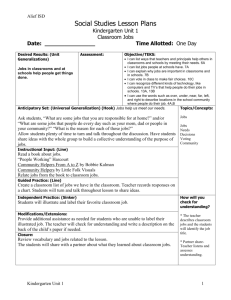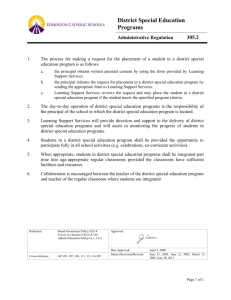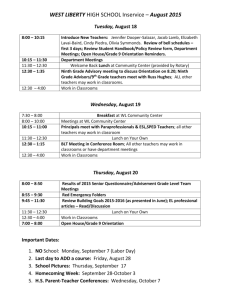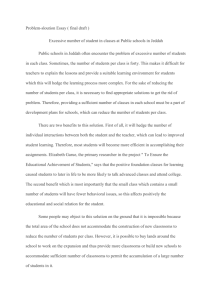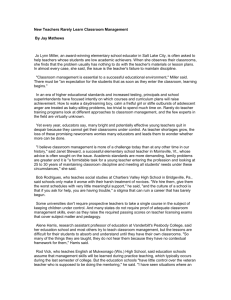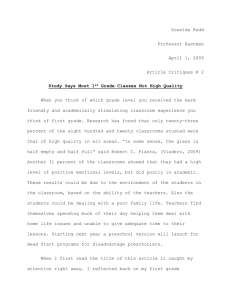Awards Round 2
advertisement
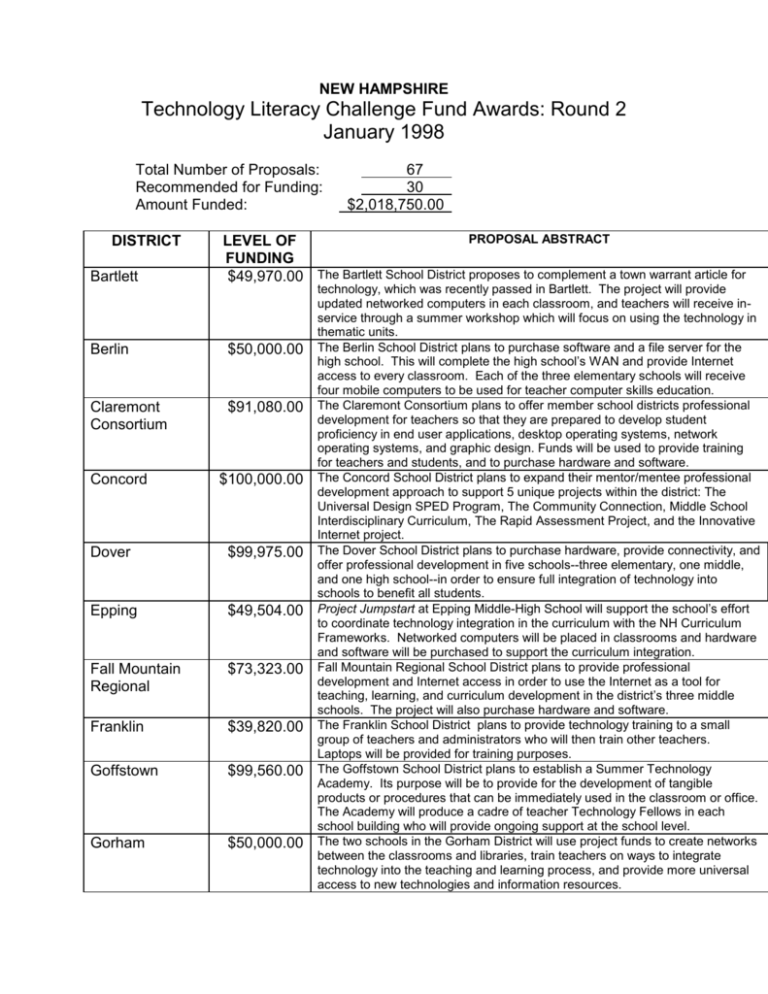
NEW HAMPSHIRE Technology Literacy Challenge Fund Awards: Round 2 January 1998 Total Number of Proposals: Recommended for Funding: Amount Funded: DISTRICT Bartlett PROPOSAL ABSTRACT LEVEL OF FUNDING $49,970.00 The Bartlett School District proposes to complement a town warrant article for Berlin $50,000.00 Claremont Consortium $91,080.00 Concord 67 30 $2,018,750.00 $100,000.00 Dover $99,975.00 Epping $49,504.00 Fall Mountain Regional $73,323.00 Franklin $39,820.00 Goffstown $99,560.00 Gorham $50,000.00 technology, which was recently passed in Bartlett. The project will provide updated networked computers in each classroom, and teachers will receive inservice through a summer workshop which will focus on using the technology in thematic units. The Berlin School District plans to purchase software and a file server for the high school. This will complete the high school’s WAN and provide Internet access to every classroom. Each of the three elementary schools will receive four mobile computers to be used for teacher computer skills education. The Claremont Consortium plans to offer member school districts professional development for teachers so that they are prepared to develop student proficiency in end user applications, desktop operating systems, network operating systems, and graphic design. Funds will be used to provide training for teachers and students, and to purchase hardware and software. The Concord School District plans to expand their mentor/mentee professional development approach to support 5 unique projects within the district: The Universal Design SPED Program, The Community Connection, Middle School Interdisciplinary Curriculum, The Rapid Assessment Project, and the Innovative Internet project. The Dover School District plans to purchase hardware, provide connectivity, and offer professional development in five schools--three elementary, one middle, and one high school--in order to ensure full integration of technology into schools to benefit all students. Project Jumpstart at Epping Middle-High School will support the school’s effort to coordinate technology integration in the curriculum with the NH Curriculum Frameworks. Networked computers will be placed in classrooms and hardware and software will be purchased to support the curriculum integration. Fall Mountain Regional School District plans to provide professional development and Internet access in order to use the Internet as a tool for teaching, learning, and curriculum development in the district’s three middle schools. The project will also purchase hardware and software. The Franklin School District plans to provide technology training to a small group of teachers and administrators who will then train other teachers. Laptops will be provided for training purposes. The Goffstown School District plans to establish a Summer Technology Academy. Its purpose will be to provide for the development of tangible products or procedures that can be immediately used in the classroom or office. The Academy will produce a cadre of teacher Technology Fellows in each school building who will provide ongoing support at the school level. The two schools in the Gorham District will use project funds to create networks between the classrooms and libraries, train teachers on ways to integrate technology into the teaching and learning process, and provide more universal access to new technologies and information resources. Hillsboro Deering $49,735.00 The Hillsboro Deering School District will provide extensive professional Hudson $99,818.60 Lincoln Woodstock $50,000.00 Londonderry $100,000.00 Manchester $100,000.00 Mascenic Regional $49,982.00 Merrimack $56,988.76 Merrimack Valley $58,835.00 Nashua development through a variety of delivery strategies to increase the skills of teachers and to integrate technology within the curriculum and learning environment. It will add a small number of computers to establish “demonstration classrooms” in each building, and it will establish Internet connectivity to each building and to each classroom and office in the high school through a Local Area Network. The Hudson School District plans to place a teacher/student multimedia workstation in every classroom, create a satellite mini-lab, integrate technology into existing curriculum, facilitate alignment with NH state frameworks, identify a targeted technology application and academic area for each grade, provide professional faculty development, and equalize technology access for students and teachers. The Lincoln Woodstock School District plans to continue development of a wide area network connecting the school with local libraries, and create an equipment loan program. It will fund a position (half-time) to provide training to the district libraries and community. The Londonderry School District plans to place clusters of computers with Internet access in high school classrooms, begin to develop a core of technology leaders at the high and middle school levels. After training selected teachers in the use of technology in the classroom it will provide continued opportunities for teachers in grades 1-12, provide internet access to every classroom in grades 1-12 and create a central electronic resources clearinghouse. The Manchester School District plans to focus on English/Language Arts at the 5th grade and will allow students access to Internet and intranet learning activities. Ongoing support is provided from Technology Mentors and Reading Specialists. The Mascenic School District plans to develop a program that teaches students in all grades how they can use computer resources. Teachers will be trained to create lessons for classroom use. Networks will be set up to connect the libraries, computer labs and classrooms at the high school, middle school, and elementary schools. The libraries and labs will be open for all community members for one night per week. The Merrimack School District plans to improve math instruction and student performance on the Statewide Assessment through use of technology. A master math teacher in each of the five schools will be identified to work in conjunction with a team of teachers in each school. A week-long summer institute will establish a cross-level learning community through the sharing of best practices, exchanging recommendations for effective instructional strategies, and establishing a peer review process. The Merrimack Valley School District plans to complete the physical wiring of two elementary schools, the middle school and the high school. A fiber link between the middle and high schools and the SAU building will be installed, thus enabling the development of a web presence for all three buildings. $100,000.00 The Nashua School District plans to purchase hardware and software, offer Northwood $50,000.00 Orford $19,890.00 professional development; and provide intranet and Internet access to classrooms in five elementary schools that serve the largest groups of low socio-economic families in Nashua’s population. The Northwood School District plans to provide professional development activities that focus on the integration of technology into the teaching and learning process. Educational software will be purchased and the Internet will be used to assist the alignment of district curriculum with NH frameworks. The Orford School District plans to purchase refurbished Mac computer workstations to create computing centers in classrooms in grades 3 – 6. The project will also provide ongoing professional development activities throughout the year, focused on technology integration. Pittsfield $50,000.00 The Pittsfield School District plans to build a wide area network (WAN), provide Rochester $90,000.00 The Rochester School District proposes to create trainers within the district. Salem $92,368.18 Shaker Regional $50,000.00 Somersworth/ Rollinsford $48,026.46 White Mountain Regional $49,950.00 Winchester $50,000.00 Windham/ Pelham $100,000.00 Winnisquam Internet access and have current technology available to every Pre K – 12 classroom in the district. $49,924.00 Each trainer will also work with four students to create an interdisciplinary project. Extended hours for community access and training to increase educational improvement are incorporated into the plan. The Salem School District plans to provide professional development focused on the use of technology for examining assessment data. The District plans to also provide increased classroom Internet access as a tool for enriching instruction, and linking assessment data to instructional activities. Shaker Regional plans to use grant funds to connect the Belmont and Canterbury town libraries with the two elementary schools, the middle school, and the new Research Information Center at Belmont High School. The proposal provides for the purchase of satellite technology for distance learning, laptop computers for loan, and an LCD projector for large – group presentations. The proposal also provides for paying for extended hours at the Research Information Center (RIC). The Somersworth and the Rollinsford School Districts plan to acquire network infra-structure, including hardware, workstations, and relevant software. The plan also to provide training, establish local area networks (LAN) within each school, and wide area network (WAN) with unified Internet access. In addition, in cooperation with the city of Somersworth, they plan to create a Web site. The White Mountain Regional School District plans to use two teachers to coordinate the integration of technology into the district’s curriculum. Internet, satellite, and multimedia technologies will be developed, taught, and modeled throughout all grades and buildings. The Winchester School District proposes the “Mapping the Future” project, involving Thayer High School, as well as nearby Hinsdale, Monadnock Regional, and Keene High Schools. Teachers will be trained in the use of Global Positioning hardware and Geographic Information Systems software, in order to offer students authentic experiences in the study of their natural environment. The Windham and Pelham School Districts plans to provide multimedia workstations, with peripherals and software for teachers and students, high speed Internet/Intranet for both districts classrooms, work areas and libraries; building network infrastructure and components for classroom connectivity. The districts will support school reform through the integration of technology into the curriculum. Winnisquam Regional School District plans to leverage existing district efforts by placing a multimedia station in all grade 1-5 classrooms (35). Model lessons based on the curriculum frameworks will be created by CoreTeacher Teams comprised of individuals who demonstrate proficiency / enthusiasm for technology-based learning. These teams will provide collegial staff development on-site at school labs.

